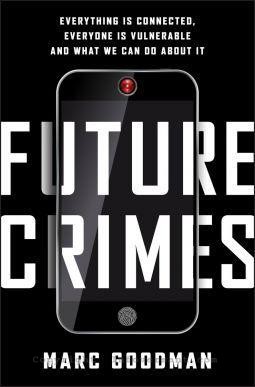Technology is new, crime is not. From the times of carts and buggies to bullet trains, robbers have exploited every technological advancement until now. Technology by itself doesn’t make anything or anyone safe and information technology products are the most vulnerable.
Marc Goodman strives to expose the readers to these vulnerabilities in the exponential technological growth happening in our world today. Future Crimes talks about how our connected world has become more dangerous where all information about a person can be gathered in a matter of clicks and access (legal or illegal) to a few tools.
Marc Goodman consults with UN, NATO, and Los Angeles Police Department on next generation security threats such as cyber crime, cyber terrorism and information warfare.
 Future Crimes: Everything Is Connected, Everyone Is Vulnerable and What We Can Do About It
Future Crimes: Everything Is Connected, Everyone Is Vulnerable and What We Can Do About It
Author: Marc Goodman Hardcover: 464 pages Publisher: Doubleday (February 24, 2015) ISBN-10: 0385539002, 978-0385539005
The author begins Future Crimes talking about some of the most famous data thefts where big corporations have been targeted. But just because you are an individual, it doesn’t necessarily mean that you are safe. Author gives a detailed account of how a Wired journalist was targeted and lost control of his iPhone, iPad, and almost everything that was connected to these devices.
He points out that people are increasingly volunteering critical information about themselves on the social networks that are vulnerable to attacks. Moreover, it is not just the attackers that we need to be wary of. It is also the networks themselves. In You’re Not the Customer, You’re the Product, his example of the PatientsLikeMe website will rob you of all the belief that you have placed on forums and networks as related to the privacy of the information you share on sites like these. The author narrates an example where all the patients’ information about their experiences and illnesses were mined by an unauthorized Nielsen company bot, which could be later sold to insurance companies that will decide your premiums based on the ‘confidential’ information and make numerous other decisions about the service and offers you receive.
Big data can bring you the best of products and help companies come up with just the solution you need. But this same data can kill you, literally. The 2008 Mumbai terrorist attack was unique because the attackers used real-time data compiled from multiple sources. Updates that people like you and me shared, helped orchestrate one of the most violent and prolonged terrorist attacks in the world.
Technology brings new and exciting ways to make our lives more efficient and easy. But it also provides as many ways to make it miserable. From vulnerable online banking to smart homes that could be hacked and controlled at whims of a teenager sitting thousands of miles away, everything connected to the grid is exposed to an attack. Electric grids, water treatment plants, Dam gates can be accessed and attacked with devastating results – remember the Fire Sale concept in Die Hard 4? It is not just fiction, there is a possibility of that happening.
All the information in the book is true. But the author tells these horrifying stories in a style befitting a thriller. You will read about the crimes that you have read in newspapers and about those that never surfaced in the public glare. You will read about crimes that are waiting to happen. Are you thrilled about the new app that controls your house temperature and warm it before you reach home on a cold afternoon? Well be also aware that this same technology can be used to start a fire.
All it takes is one smart, twisted attacker to repurpose the code for a very different output.